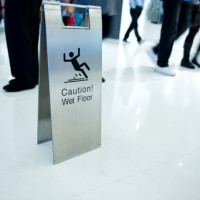Court Allows a Hearing on Slip and Fall Plaintiff’s Late Filing of Claim Against New Jersey Motor Vehicle Commission Facility

If you are injured in a slip and fall on government property, you may be able to file a claim against the government for negligence, but you must act quickly. Under the terms of the New Jersey Tort Claims Act, you must file a notice of your claim within 90 days of the accident, or your case can be thrown out. This happened recently to a plaintiff who was injured in a slip and fall accident at the New Jersey Motor Vehicle Commission, but on appeal the court decided she was at least entitled to a hearing on the question of whether she should be allowed to file a late notice of claim, given the circumstances.
The plaintiff in Barber v. New Jersey Motor Vehicle Commission filed her tort claims notice eight days late. Her reason for filing late was that at first she was in such severe and debilitating pain that she was only focused on getting medical treatment and not on filing a lawsuit. Then, due to delays in getting authorization from her insurance carrier, by the time she got an MRI and was scheduled for almost immediate surgery, she was already seven days past the government’s short 90-day deadline. She immediately contacted a lawyer, who immediately sent the tort claims notice and filed a motion with the court for permission to file a late tort claims notice. The court denied the motion without even holding a hearing, and this appeal followed.
In order for a court to give permission to file a late notice, the plaintiff must prove that extraordinary circumstances impaired her ability to file within the 90-day period, and also that the defendant would not be unduly prejudiced by allowing the plaintiff to file late. The motion judge found that the defendant would not be prejudiced by a late filing but also decided that the plaintiff did not prove extraordinary circumstances based on her medical condition.
The appellate panel sent the case back to the trial court for a hearing and reconsideration. The question about whether the plaintiff’s medical condition was severe enough to affect her ability to file the claim on time is a factual question which deserves to be considered in court, where the plaintiff can submit evidence and testimony and argue in favor of her position.

